“These aren’t quotes anymore, but archaeological remains”
Interview with Jean-Luc Godard
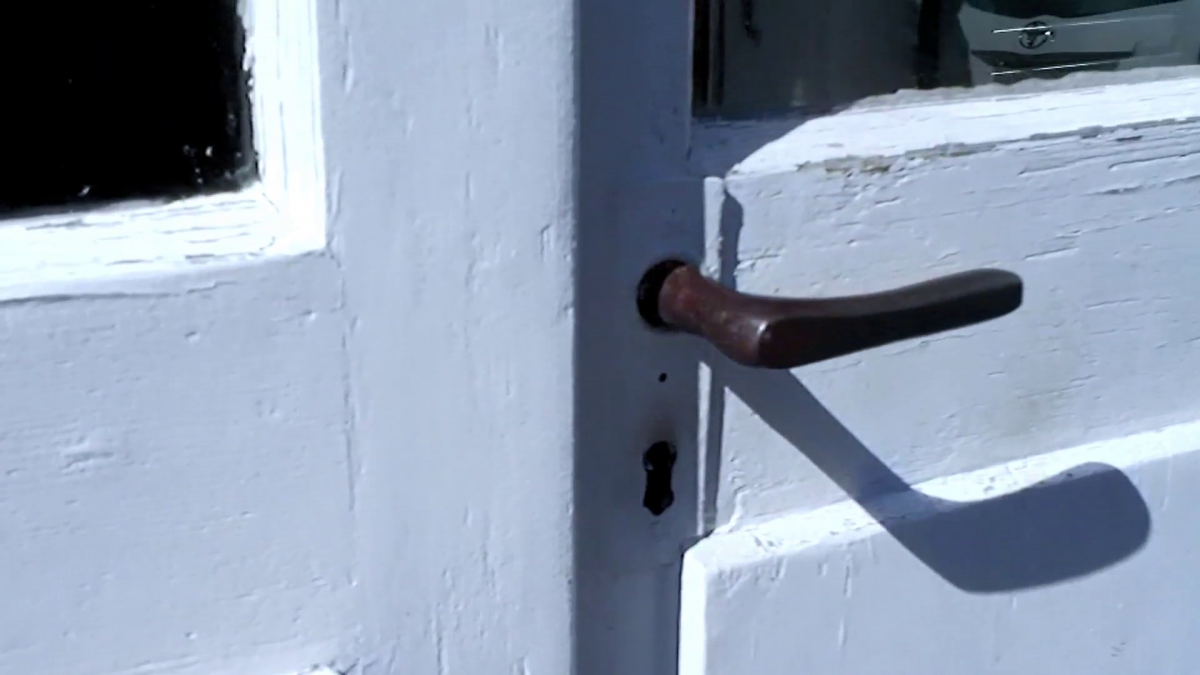
Antonina Derzhitskaya and Dmitry Golotyuk: Many people were inclined to consider Adieu au langage [Goodbye to Language] your ‘goodbye to cinema’. Luckily, as you have already mentioned, that isn’t the case. But is it a coincidence that it seems as though you are tracing your own cinematographic journey in the film? You quote your own articles from the Cahiers du Cinéma days, when you were still only making short movies. You cite the same Aragon and the same Apollinaire as in À bout de souffle [Breathless], your first feature length film. The argument in front of the washing machine reminds us of Numéro deux [Number Two]; the violent scene in the shower, even more clearly, of Prénom Carmen [First Name: Carmen]; and the formula “Abracadabra Mao Zedong Che Guevara” is borrowed from King Lear, indirectly referring to your Maoist period. Finally, we hear a fragment of the soundtrack of your last film: the voice of the girl Florine quoting Beckett. This could look like an artistic testament.
Jean-Luc Godard: Yes, but I didn’t think of it like that.
So it was a coincidence rather?
Obviously, I have certain memories and sources to which I return, phrases that could be called favourite ones. If I can use them, I use them. By the way, when it comes to Beckett, I read that when he was just starting to get published, his audience consisted of only two or three hundred people. Fame only came to him substantially later on. And with Adieu au langage, I thought about how... It’s about langage above all. I’d read a book by a certain German philosopher from the beginning of the century that’s called Die Sprache. In general, it says something like... What was it...? Wait, I’ll get it. (He comes back with a book by Fritz Mauthner.) At the end of the book, he says: “We would perform the redemptive act (‘redemptive’ sounds a little Christian, but... – JLG) if we were able to lead any critique to the deliberate, quietly desperate death of our thinking/speaking (of the way we think and speak – JLG), if we didn’t have to perform this critique with words that only look like life.” That is to say that, when it comes to cinema or to images, we are today mostly in a time in which words, or that which people call ‘langage’, refer to images and don’t allow the images to become parole. It’s always the words that cover everything: we see it on television and so on. So, that was the idea. Adieu au langage means goodbye to our way of thinking/speaking (if possible, if I succeed). That was the idea. And in Switzerland, at least here, in our canton of Vaud, the pays de Vaud as they say, adieu...
Yes, yes, it means ‘hello’.
Adieu also means ‘hello’. Both are used. What is your name?
Antonina.
If we run into each other in the street, I say to you: “Adieu, Antonina.” It’s a matter of tone. And then after that, if I say “goodbye”, I’d say: “Adieu, Antonina.” (He pronounces this adieu with a deeper voice.) There you are.
Coming back to the quotes, you also evoke Kirillov’s statement on suicide in your film.
Yes, it had interested me a lot when I was young and I came back to it. Kirillov was also one of the characters in La chinoise. It is from the Dostoyevsky novel Demons, I think, which I have never read in its entirety. I have read other Dostoyevsky novels in full, but not that one. And there was also one of the first philosophical essays by Albert Camus – I was still young, before my baccalauréat – which was called The Myth of Sisyphus and started with a phrase that I once put in a film, For Ever Mozart, I believe: “Suicide is the only truly serious philosophical problem.”
You also put it in Notre musique [Our Music].
Perhaps. Yes, the phrases aren’t quotes anymore. They are basically part of me and I say them as if I have invented them. (Laughs)
But you aren’t trying to create a certain continuity between your films?
No, not at all. Well, I obviously try to link a little, but sometimes it goes back and sometimes it goes forward.
At least, there is a clear, amusing and somewhat provocative link between Film socialisme [Film Socialism]1 and Adieu au langage: in the former film, a boy, Lucien, announces that, when the time of equality will come, he will talk about shit, and in the latter, Marcus and Gédéon fulfil his promise.
Yes, yes. This shit story also comes from Antonin Artaud, who says: “As soon as you speak of being (it is very anti-Heidegger), you speak of shit.” And in French, when someone talks nonsense or makes mistakes, we say: “C’est de la merde. [You are full of shit],” meaning that what comes out of the mouth is no different than what comes out from behind.
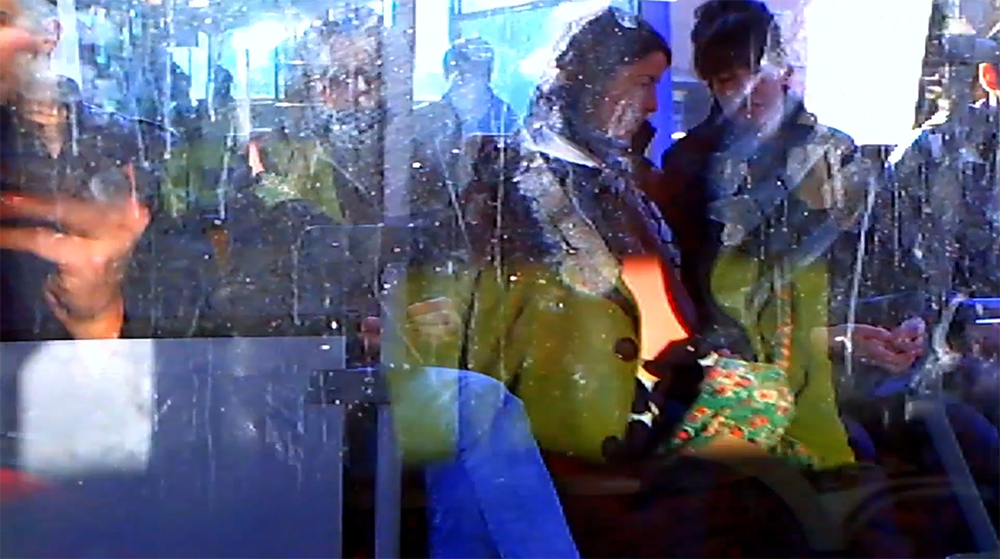
Anne-Marie Mièville is missing from the credits of Adieu au langage.
Yes, we only talk these days. She expresses her view, but...
So you continue to discuss what you are doing with her?
Yes. As they say, we don’t often talk, but it’s not silent either.
And is it Anne-Marie who brought the new music in your film – the recent recordings by Dobrinka Tabakova and Valentin Silvestrov – to your attention?
No. It’s music that was sent to me by ECM. From time to time, they talk to me. They regularly send me stuff and sometimes I use pieces like that. Because, you know, music rights issues are easier with ECM than with others.
But you need to pay regardless?
Oh yes, that’s something you need to pay. As Eddie Constantine puts it in Allemagne 90 neuf zéro [Germany Year 90 Nine Zero]: “Always loving, always suffering, always paying.”
So, do you yourself listen to what they send you?
Not immediately. When I make a film, especially when we are editing, all of a sudden I say: “We need music there.” Then, I look around. I try not to turn it into background music, like in American movies, something which is extremely unbearable. Even in Hitchcock movies, the music is unbearable. For me at least.
We, for our part, very much appreciate how you treat music and sound in general. As musicians, we believe you are a musician as well.
No, because I don’t listen to music for myself. I have maybe listened to a lot of music in the past, mostly classical music, but not later on. I never listen for myself, only when I am looking for something: a sound that is the equivalent of an image, that is closer to parole in its deeper sense. Because the Americans and the Germans don’t have a word for parole. They say Worte or words. Even Hamlet says: “Words, words, words.” But there is no word for parole. I remember what Malraux said about parole (I once put it in a film, not in For Ever Mozart, but in which one?): “When you hear your own voice...”
“Where does it come from?”2
“... you don’t hear it with your ears, like the voices of others, you hear it with your... When you hear your own voice, it comes from the throat.” It doesn’t come from the brain or anything like that. I don’t remember the name of the film. But starting with For Ever Mozart, it changed somewhat for me. I got closer to this ‘goodbye to language’.
I love the ironically pompous beginning of For Ever Mozart: the film title appears to a first chord, fortissimo tutti, from a classical concerto for piano and orchestra. But the most beautiful part is that it is not Mozart, but Beethoven.
I don’t remember.
As if it were easy to mistake one for the other. I also dwell on this comical gap between what you see and what you hear because it mirrors an opposition between pure art and socially engaged art that is at the heart of your film. Because we very well know that Beethoven was a musician with a stronger political conscience.
Yes of course, he saw Napoleon the emperor leave for Russia. But all of that, for me, they’re not even quotes anymore; they are archaeological remains. The film I am now making, I call it... If it were a literary work, I would call it ‘essay in archaeological morality’. But if you name it ‘essay’, it becomes very literary, so I just name it ‘archaeological morality’. And it is made of pieces of film where we try... Just like, I don’t know if you know these two Italian filmmakers who do archaeological research... What are their names? I’ve forgotten them. It’s underground cinema. I don’t remember their names.3 These days, names very often disappear, and not because I am losing my memory, but because I either see the faces or the phrases, but not like words you hear, but like paintings or so. Even in my life, if I say: “Well, I’m going to take a cigar,” I see the image of a cigar, but the word comes later. Or: “I’m going to have lunch at that restaurant,” but the photo of the restaurant comes first.
It is closer to what you call ‘langage’.
Yes.
It seems like, in the 1980s, you moved to more general, ahistorical issues; but at the same time, you continue to be engaged in the current, including political, events, which have slowly regained their place in your films since the middle of the 1990s. We could say that both Mozart and Vicky are present nowadays.
Who? Vicky?
Vicky, the director from For Ever Mozart.
Oh yes, Vicky. But yeah, all that has to do with growing old. And I always, already at a young age, because I come from a somewhat reactionary, protestant background... I learned about the Second World War on my own. I didn’t even know about it... I remember that when the Germans invaded Russia, I only afterwards got interested in Tolstoy’s War and Peace. In memory of that. My parents didn’t talk to me about that time, even though they were part of the Red Cross in Switzerland and helped children. And I remember I knew both the names of the German generals as well as the names of the Russian ones. And that I put little flags and stuff... I remember the name of the Battle of... the taking of Rostov. And that has stayed with me, because all that time, from fifteen – or even earlier – until twenty-five, I discovered on my own afterwards. And if I was somewhat of a militant, it came later. The more I went, the more I was interested in arriving afterwards instead of during... To go to Sarajevo after it was finished. To go to Palestine when it started to finish: the Palestinian revolution and so on. Whereas all the militants... In Cuba, in 1968, there was a big meeting of intellectuals to celebrate Castro and company, and I was also invited at the time. I didn’t want to go with the others; I went there alone, for myself, paying my trip. Things like that. Always afterwards, afterwards.
I believe that wasn’t always the case. For example, Raoul Coutard says you wanted to ‘mess’ with Giscard d’Estaing when you were making Passion...
Pfff! Maybe that’s what I said. But Raoul surely didn’t really understand. He had his own interpretations. He was an old Indochina campaigner like Schoendorfer or so. I remember that with Pierrot le fou, it wasn’t very nice, but he hated the Jews as much as the Arabs. He had a light preference for the Jews against the Arabs, but he hated both. (Laughs)
If I remember correctly, you initially wanted to release Soigne ta droite [Keep Your Right Up] before the 1986 elections.
Perhaps.
And the protagonists had to be two policemen: a left-wing and a right-wing one.
I don’t remember. But it was all appearance. I am very late compared to a lot of other people. I only started out in cinema when I was about thirty, and for me, my life or my thoughts have always been lagging behind cinema. Like, if it were a train, cinema would be the locomotive and politics and all that would be the last carriage. It is from For Ever Mozart and mostly Film socialisme onward that it started to be both at the same time. In my personal life as well, how my personal life has joined my cinematographic life.
At the end of For Ever Mozart, we see how pure art, art for art’s sake, triumphs over so-called engaged art (I mean Vicky with her fatal Bolero). Is this irony?
I don’t know.
Do you believe that art that is too attached to current events carries failure within itself?
Yes, I suppose so. In which film was it? I have forgotten the name of the film I made in Sarajevo... Notre musique, yes. There is a little-known philosopher in the film, Jean-Luc Curnier... He has just written a very interesting book called Démocratie pirate4 – I don’t know if it is out yet – in which he says that real democracy existed at the time of the pirates, among them. Or on the ships, among the sailors who rebelled and became the pirates about whom Hollywood made dozens of films, such as Mutiny on the Bounty, who ended up settling with some girls in Polynesia or so. (Laughs) But they had something that doesn’t exist today. At some point, I make Curnier say a line by a contemporary of Sartre, less known, called Claude Lefort, who said...
“Modern democracies...”
Exactly. “Modern democracies, by turning the political into a separate field of thought, predispose to totalitarianism.” It’s one of those phrases we would today call a key phrase. Me, I always like to say that maybe they are keyhole phrases, not key phrases. Because when you say: “That is the key,” “the key of dreams”... even Freud always forgets about the keyhole. That is to say, he forgets about the image.
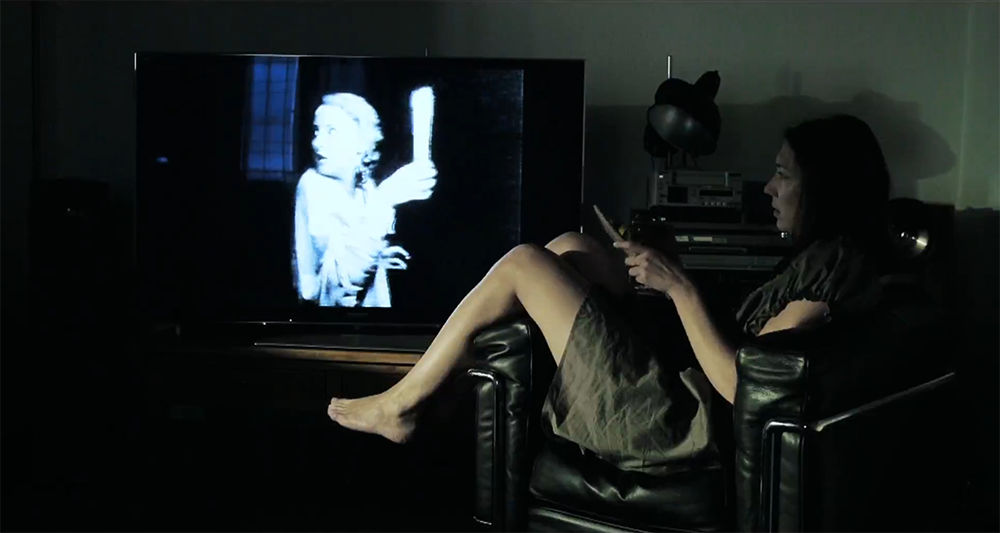
In Adieu au langage you also quote Jacques Ellul, who speaks about Hitler’s second victory, through technique and technicians. Towards the end of the film, you introduce a dialogue from Frankenstein, in which the main character refuses to create another monster (a technical monster, we could say). A couple of minutes later, a drawing of the Cross of Lorraine, which is the symbol of the Resistance, appears in the frame.
Yes, it was the symbol of Charles de Gaulle, even before the Resistance.
You somehow take part in the Resistance that way, by means of art.
Yes, yes.
This reminds me of Jean-Marie Straub, who believes Webern’s abstract music is more political than Berg’s (with his Wozzeck). One of his most political films is called Chronik der Anna Magdalena Bach [The Chronicle of Anna Magdalena Bach].
Yes, I understand what he is saying. Straub lives here, by the way.
Where is ‘here’?
In Rolle. Perhaps he is seriously ill, I don’t know. He has a friend who has lived with him since Danièle Huillet died. We occasionally meet. I see him less now, because we don’t really have anything to say to each other. That’s how it is. From time to time, he sends me his films.
Do you appreciate his new films?
I appreciate his work, unlike others. I think he’s more of a sculptor, who carves stones. What confuses me is that he always starts from the text, but that the text is like a stone to him, which he polishes before our eyes. That is, by the way, my personal opinion. He made a small film on Montaigne, which everyone finds useless and unbearable – with those endless shots of his, in which nothing happens. (Laughs) But I think he is something of a sculptor... of a Michelangelo. Playing the critic now, I resort to the language I am trying to get away from myself. But I would say something like that.
There are those who fight for the purity of the film language, in order to free it from the influence of other art forms, by moving away from painting, not using music, and so on. You rather seem to go in the opposite direction. Your cinema is a kind of intersection of art forms.
Yes, you could say that.
And sometimes you purposely blur the boundaries between them, by comparing Notre musique to a book, by defining Film socialisme as a three-part symphony or by saying about Tentative de bleu, your new project, that the viewer is inside a sculpture. Is it really a three-screen film?
Not yet. If I ever manage to finish it, then, perhaps, we will try to cut it down; but we will try to do so by distributing it over three screens, that is, by dividing it in three parts. (Laughs) And to turn it into... what’s it called... an installation, an exhibition on three screens, which is really easy. Rather than just showing it like that, because the flatness of the screen bothers me. We somehow lost (and not even only somehow, but that’s normal, because nothing stays the same.) the sense of space that was inherent in the early films, before the Second World War. After that, everything has become flatter, very different from painting. Sometimes, a good photograph expresses more than a film image. Even than tracking shots. I remember Cocteau used to say that it’s foolish to do tracking shots because they immobilize the image.
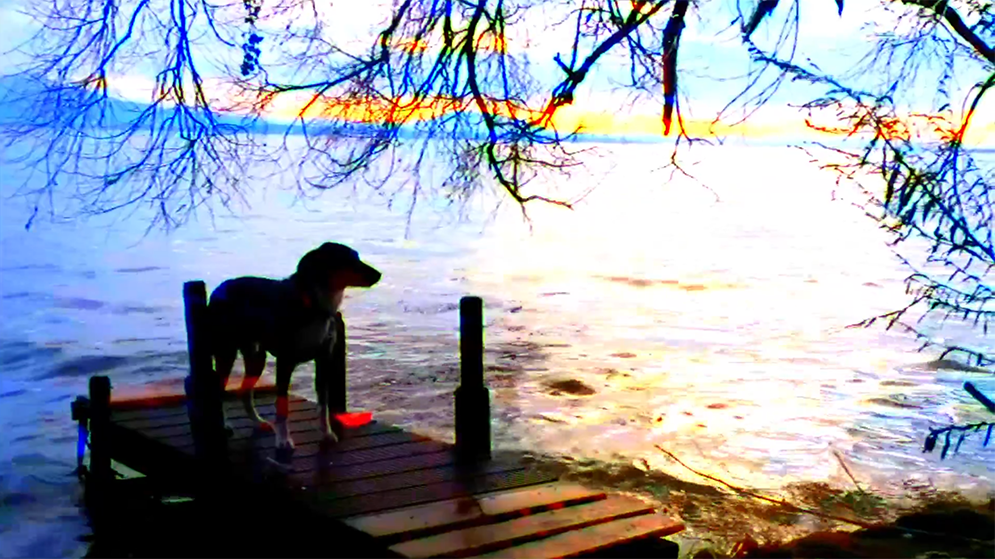
Do you now edit during the shoot?
Not really. Sometimes... These days, I start with a script, or rather, a storyboard, as the Americans say, but the order of the shots is not chronological, but based on something more unconscious. Like a painter. Traditional painters first made sketches. I often prefer Delacroix’s attempts and sketches over his large paintings, because in the sketch you feel the movement and openness, whereas the large painting is static, with words on it. We say: “Liberty Leading the People.” But before that, when he makes a drawing, we feel freedom in action.
So you haven’t started editing your new film?
I’m only just starting. Based on what I call a script idea, an outline of a script, with nothing but pictures. In the past, they also did it that way. I know that Fritz Lang, when he was preparing his first films in America, began with a report about the selected region or subject, and only after that put his mind to the script. He didn’t try to write something right away. I think it can be compared to a musician who works on the piano before writing his symphony, because writing is writing. That’s why I have always liked free jazz (although I was never really into it): nothing is written out.
Tentative de bleu, is that the current name?
No, now it’s just Image et parole, and in brackets: Papyrus.5 It’s as if we have found an old papyrus, glued together. These two Italian filmmakers do stuff like that: they piece together a whole from fragments of other people’s 35mm films. They closely examine frame after frame. That is to say, for them it is an archaeological discovery. That way they can discover certain details – fragments of a broken vase and so on. Then, like archaeologists, they clean them with their brushes and see what it is. Their approach reminds me of what we call ‘archaeological excavations’ which allows them to discover that in the past there was some city or something else – in order to create a sense of the real. That’s what I’m doing nowadays. Something I find very stupid is all of those films shown at the Nyon festival here... (Laughs)
Is there a Nyon festival?
Yes, it’s called Visions du Réel.
What you are talking about is often referred to by the English term found footage.
Found footage. Indeed.
There are, for example, a couple of Austrian directors working in this genre.
Which directors?
Gustav Deutsch for example.
I don’t know him. I don’t watch anything. Sometimes I read about some film in the newspaper, and I ask them to send me a copy on DVD – to somehow keep up with things. Anne-Marie doesn’t even do that.
And how do you pick these films?
I say to myself: “Here, maybe, there is...” I hope to find (it’s a little utopic or nostalgic) something that we once discovered, more or less wrongly, and praised to the skies in Cahiers du Cinéma. But there was... All of a sudden, we realized: “Oh, so it is possible,” in relation to the French cinema in which we had been raised. I came along significantly later than others – Truffaut, Rivette or Rohmer. I followed, I watched, I didn’t say anything.
But À bout de soufflé came out less than a year after Les quatre cents coups [The 400 Blows], which is not much later.
Yes, but it’s still later. Let’s just say I’m more of a second generation.
The old title of your new project, Tentative de bleu, hints at painting.
Yes, I think there will be a reference to painting in the end; but it isn’t obvious because I’m making a very long introduction. It’s as if, before seeing the whole hand, we have to look at each finger separately. So I’m making five elements: war, travel, law (based on Montesquieu’s The Spirit of the Laws) and a last one called La région centrale, in memory of an American underground movie6 and, after that, the hand. The hand is a small story based on a book that seemed interesting and is called Arabia Felix. ‘Arabia Felix’ was a term used by 19th-century travellers (Alexandre Dumas, for example) to refer to this region of the world, the Middle East, which is now in crisis. The action takes place in one of the countries in the region where no oil is found. The people are satisfied with this situation,7 but their ruler wants to gain dominance over other Arab countries that betrayed him.8 He is plotting a pseudo-revolution, which fails, and then we’re back to square one. I am shooting without any actors. I don’t need any. There is a narrator who reads fragments from the book, so that we understand the general story, which is a kind of parable.
So there won’t be any actors at all?
No, not at all. Not even one. My colleague Jean-Paul Battaggia, told me: “Look, to read that kind of text, you could take Jean-Pierre Léaud. That would be great.” But I said: “No, because it would be an actor playing a text, and I don’t need any actors.” So either I’ll do it myself, or I’ll find someone unknown to do it.
Since you have mentioned Léaud, I am reminded of Anna Wiazemsky and a very strange project related to her. Are you aware that Michel Hazanavicius...9
Oh, I don’t even want to hear about it. It makes me uncomfortable. Though I don’t care.
It sounds like a stupid idea.
Yes. But it’s the same company, Wild Bunch, that has produced my last films. They didn’t even dare mention it. (Laughs) It’s stupid.
But you couldn’t do anything about it?
No, that’s how people are. People are free.
Do you follow what is happening in contemporary art?
No, not at all.
I mean the last forty-five years. After painting, let’s say.
No.

Basically, we could say that contemporary art privileges the idea and dismisses the form, or rather ‘the beautiful’. How important is beauty to you? Do you consciously seek beauty?
No, not anymore. At least... I don’t know, certain results, but not necessarily. Because in all that modern stuff, when I see it, I have the feeling that words come first and only afterwards comes the execution. They say: “We are going to make an installation that expresses this and that.” What Agnès Varda is doing nowadays or... What was she called? The Belgian filmmaker that died, I’ve forgotten... Chantal Akerman. It’s only words. It doesn’t work like that.
I like the definition of beauty by the German composer Helmut Lachenmann: “Beauty is the rejection of habit.” I believe we can apply this phrase to what you do, especially since Film socialisme.
Yes.
In Notre musique, a Bosnian student asks if small digital cameras could save cinema. Does that mean that you were already considering using them at that time?
Well, they didn’t exist then, did they? But almost from the beginning, I gravitated towards small things – to 16mm and so on. To simplicity and minimal means. We are three these days, making the film. That’s enough. If it were necessary... I would have loved to make a Hollywood film (at the time). I tried, but it never worked out...
The Story?10
Oh, a lot earlier. What I wanted was to make a film based on a successful book. I told an American producer: “Yes, I would love to make a film, but I would only be the director. You choose the actors, you choose the setting, you choose everything. I only direct. I don’t deal with the rest.” He didn’t agree.
When was that?
Oh, that was about ten years ago.
Why did you want to limit yourself?
To try and work with what would remain. But it’s also a matter of fatigue and age. You know, I’m tired of always running and doing too much. I’m not interested anymore. I don’t feel like it anymore. Even a team of three is tiring because the other two are my friends and they are very precious to me in everyday life. But I don’t have anyone when it comes to talking about cinema. I miss it. So, in this case, I talk to myself. And after a while, this also becomes a habit. (Laughs)
Could we say that these small digital cameras provide you with what you wanted to achieve with the Aaton 35-8?11
At the time, yes.
To make it smaller...
Smaller in quality? Today, I don’t care. Because what I’m doing in my new film is more like archaeology. I don’t care about the quality of the image.
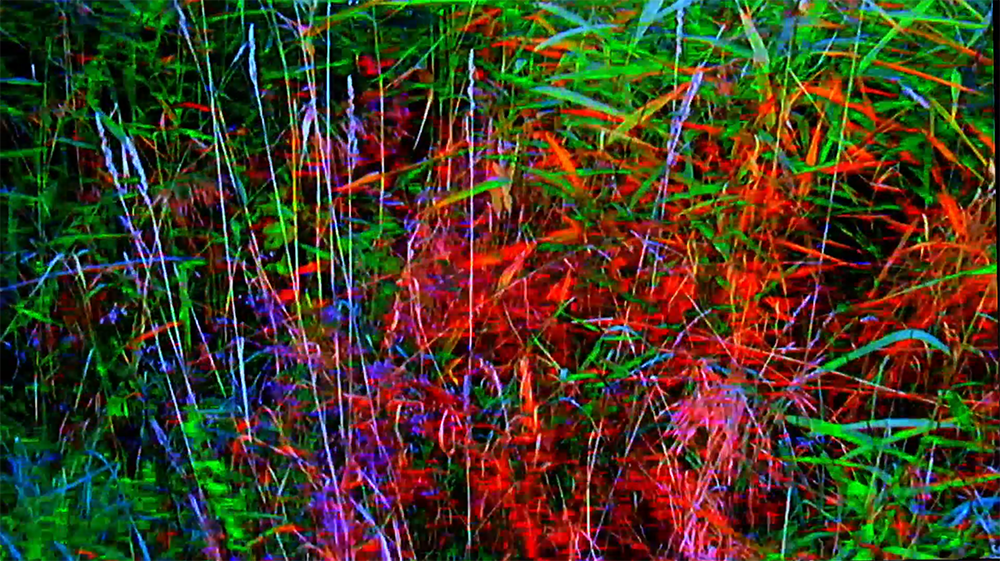
In general, you approach the digital in two ways. On one hand, you start from its flaws in order to create rich textures, which is something we could call digital expressionism...
Yes.
On the other hand, you use it in a normal way. You continue doing what you did on 35mm before. Does this mean that a film like Notre musique could also be shot in digital?
Yes, that could have been possible.
Nowadays, you wouldn’t mind?
Now, I don’t care. Besides, with digital, we ask for very little money. For the next film, the producer, Wild Bunch, offers us 300.000 euros. That’s it. And then, with 300.000 euros, I need to deliver it after two years (which leaves some time: one year to make the five fingers and then one year to make the hand). And when that is not enough, I give the money I sometimes earn when movies are shown on television back to the producer, without asking to be repaid. That means the three of us need to live off of the money for two years and use it to make the film. So if I pay three people, including myself, with the money for the film, it amounts to 9.000 euros a month. And if I do that for two years, it means 24 times 9.000. Therefore, nothing remains for the film. So I have to give what money I have in addition to that, and luckily there is a little, to the producer. I don’t want to ask the producer for anything. That’s what the economy of the film is. And it would be interesting to know if it could also be done the same way in the real economy.
But for the image – the light and depth of field – 35mm and digital are different, right?
Yes. And it depends on whether we use light or not. I only use what’s already there. I always try to keep it as it is. But with these two, Jean-Paul and Fabrice, it’s difficult because they are used to crews, and when they arrive, they put their stuff everywhere. I tell them: “It’s a décor. You can’t touch anything. You need to put your stuff over there.”12 (Laughs) But there is a lot we cannot do. We just don’t try to do it.
Why have you changed the aspect ratio?13
It’s just how television is nowadays.
But in the past, you sent a page to Cahier du cinéma with two images from Notre musique in three different aspect ratios. You wanted to show how 16/9 reduces persons and disguises the truth.
Yes, it’s not a great format. But it’s today’s real aspect ratio. I mean that, in the past, painters painted with whatever they had at hand. When tubes of paint got invented, it changed a lot: impressionism, etc. So, we only do what’s real. It doesn’t matter... Furthermore, if I release the film on DVD, it just happens, there’s no critique. Whereas in the movie theatre, there are thirty-six... Even on television: no two televisions are alike. So you can’t do anything about it. You have to try and make sure that something will remain and you need to choose this something at the beginning and search for it, if you like.
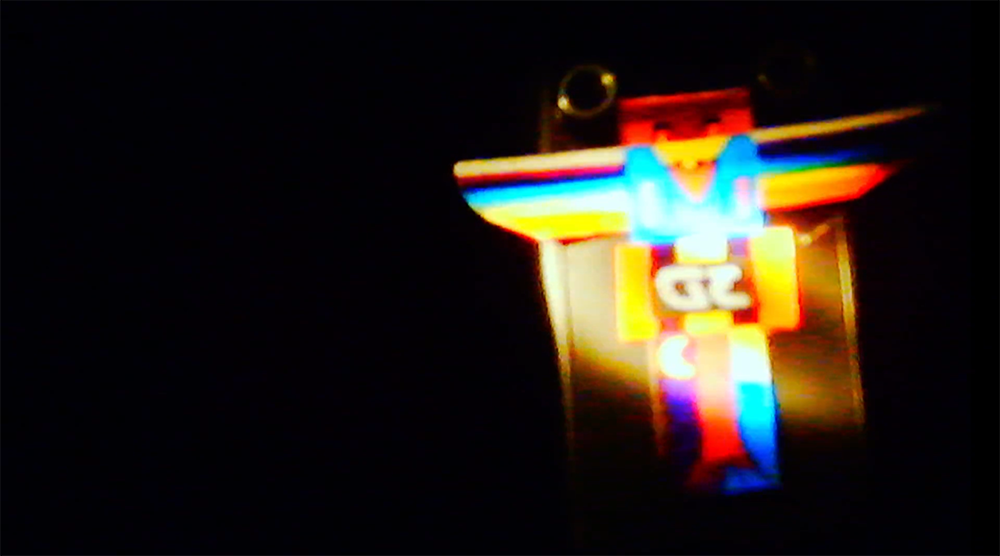
In the beginning of Adieu au langage, we see a mysterious object which looks like a 3D-camera. It appears for a few seconds in the light of a torch that keeps on moving and then, towards the end, it is on the cover of a book by Van Vogt. You put it there. The original cover is different.
Yes, I put another image on the Van Vogt cover, for the title to be there.
Why did you do that?
Because what was on the cover didn’t fit. Whereas this picture of an Indian totem or something like that (I don’t remember where I found it) seemed better. If I had published the book, I would have used that picture. (Laughs)
We know many director-cameraman tandems. In the 1960s, you formed such a tandem with Raoul Coutard. I believe Fabrice Aragno will also stay with you for a long time, even more so because he is not only a cameraman.
He is involved in almost everything. He does the final editing (from a technical point of view). Or sometimes I let him do it, saying: “Do what you think is right,” and this then gives me other ideas. Or we keep it and he makes sure everything is within the standards. During the shoot, he does both sound and image, like someone doing documentaries. Documentaries always amaze me: when we see the journalist who speaks and then the cameraman who films everything, I don’t know why one of both doesn’t do both tasks at the same time.
Is that why you don’t work with François Musy anymore?14
No, that’s a long time ago. I don’t like his classical methods anymore. We went our separate ways... We got along very well, and I was always pleased with our collaboration, but now... I’ll show you: I still work with very old equipment which often doesn’t function or not very well. Rather than seven or eight machines filling the room (the equipment is ten to fifteen years old), I could learn how to use a tablet and all this editing stuff. I don’t know... Even Fabrice offers to help me with software that does chance editing. So there wouldn’t be anything to do anymore, because the software does everything. But it’s not... No.
But Musy worked as a sound engineer on Film socialisme.
Yes, that was the last time. Because we shot in... I don’t even remember. Yes, he did the sound, because for the garage scene I wanted the sound to be very good, very clear. I wasn’t very confident myself. He neither. In addition, Fabrice wasn’t really there yet.
Over the past 35 years, you have worked with several DOPs, as well as Coutard, William Lubtchansky, Caroline Champetier, and Julien Hirsch. Why do you change them? Why, for example, did you end things with Coutard even though he did a great job of Passion and Prénom Carmen?
Well, we did a lot of films. After that, I went a different way, and he stayed where he was. It’s the same thing with Lubtchansky and the others. There were a lot of them. We started out together. At times... Lubtchansky had an assistant, that was Caroline, and Caroline had an assistant, that was Julien. I moved from one to the other and then it stopped. (Laughs)
You sometimes left Caroline alone on the set. You even sent her to Moscow to film a scene from Les enfants jouent à la Russie [The Kids Play Russian].
Yes, and she did a great job. Because she is someone who wanted to do everything, who talked about everything. I said to her: “Do you want to do it? Here is some money. Go ahead, go to Russia and film Anna Karenina’s death. I don’t want to deal with it.”
She was terrified.
I’m sure she was.
Regarding your new film, you said you needed to go to Saint Petersburg.
That was at the very beginning, even before I started it. Because one sequence, the second one, the second finger, is based on an old book by a French writer called... You see, I see the book, but I don’t remember the name... The French ambassador in Saint Petersburg at the time of Napoleon...15
Joseph de Maistre.
Joseph de Maistre. It’s a right-wing book about the war, in total Nazi style.16 Well, I have used it. And I thought then, it was very, very different, that I would perhaps go to Saint Petersburg, that we would find a young Russian couple. Afterwards, I don’t know how, but I gradually abandoned the idea.
When do you plan to finish the film?
I still hope to finish it by the end of the year, as stated in the contract. But we will certainly be a little late.
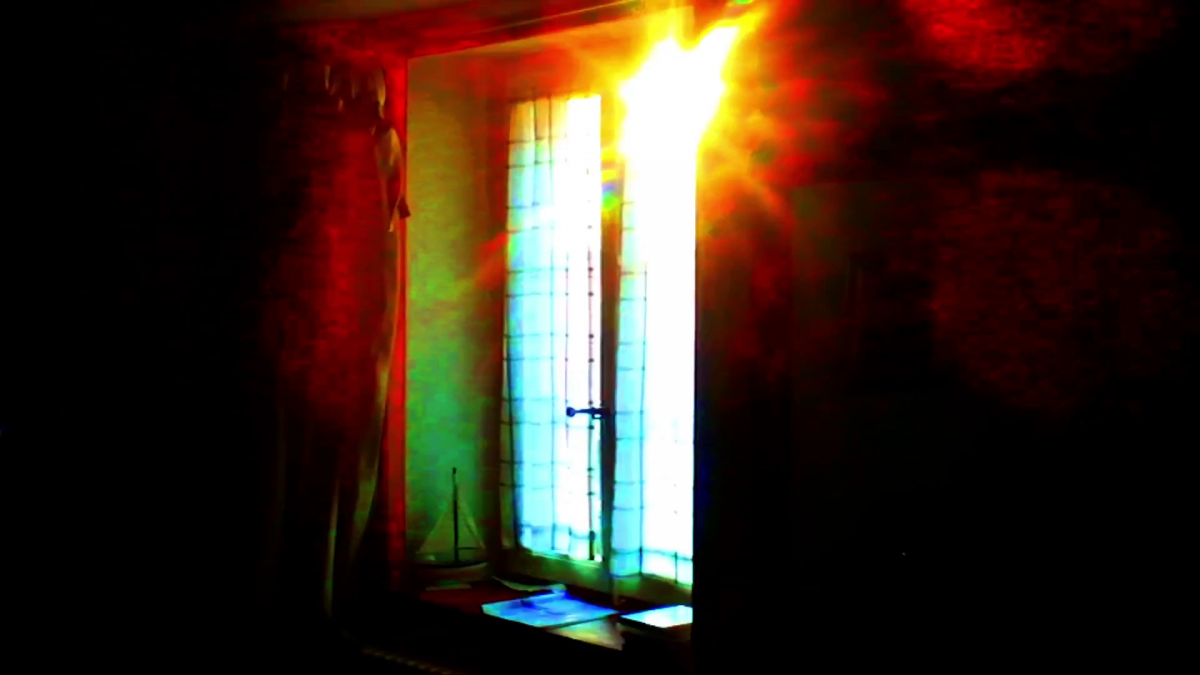
- 1See also the script for Film socialisme.
- 2A reference to a dialogue from Film socialisme between Florine and her dad: “When you hear the sound of your own voice, where does it come from? No, daddy, from here.” (She points at her throat.) Godard loosely quotes a phrase from Man's Fate by André Malraux: “We hear the voice of others with our ears, our own with our throat.”
- 3Yervant Gianikian and Angela Ricci Lucchi.
- 4The book was published by Éditions Lignes in January 2017, titled La piraterie dans l’âme: Essai sur la démocratie.
- 5Image et parole was the second working title, after Tentative de bleu. The final title is Le livre d'image [The Picture Book]. The film will be released at the 2018 Cannes Film Festival. [note by the translator]
- 6He refers to Michael Snow’s La région centrale (1971) [note by the translator]
- 7It is about the people of a fictitious emirate without oil resources.
- 8Which means they have given in to the ‘big imperial power’ attracted by the oil.
- 9He refers to the film Godard Mon Amour by Hazanavicius, based on the autobiographical novel Un an après [One Year Later] by Anne Wiazemsky. The main characters are Anne Wiazemsky and Godard. The film came out in 2017.
- 10A film project with American movie stars (like Robert De Niro and Diane Keaton) which dates back to 1978 and had to be Godard’s return to the film industry after long political and video years.
- 11At the end of the 1970s, Godard ordered a camera from engineer and inventor Jean-Pierre Beauviala. The camera had to be small, light and as easy to use as Super 8, while also producing 35mm images “with the highest current definition for cinema and television.” This resulted in the Aaton 35-8, which didn’t entirely satisfy Godard and was only used for a couple of shots, including the sky shots at the beginning of Passion.
- 12All the interior scenes in Adieu au langage were shot at Godard’s home.
- 13Film socialisme and Adieu au langage are the first Godard films to use 16/9 in decades.
- 14A sound engineer, the only almost permanent member in Godard’s crew for more than three decades, from Passion all the way up to Film socialisme.
- 15In fact, he was the Sardinian ambassador.
- 16The book is called St Petersburg Dialogues.
The interview was conducted in Rolle on 22 May 2016 by Dmitry Golotyuk and Antonina Derzhitskaya. It was first published in Russian on the website of the magazine Séance and in 2017 in French on Débordements.
With thanks to Antonina Derzhitskaya, Dmitry Golotyuk, Raphaël Nieuwjaer and Vasily Stepanov
Images (1), (2), (3), (4), (5), (6), (7) and (8) from Adieu au langage (Jean-Luc Godard, 2014)